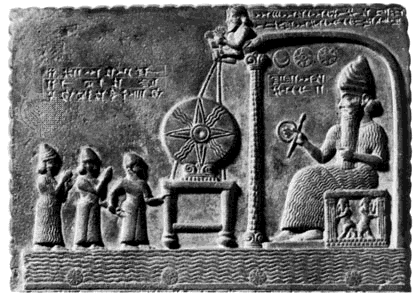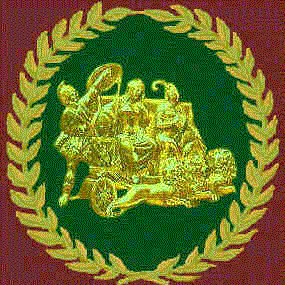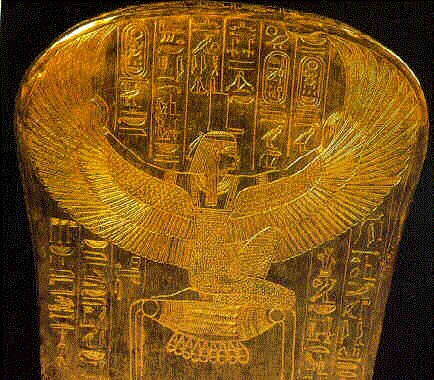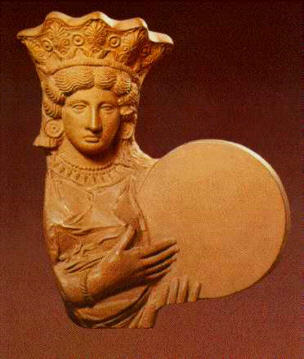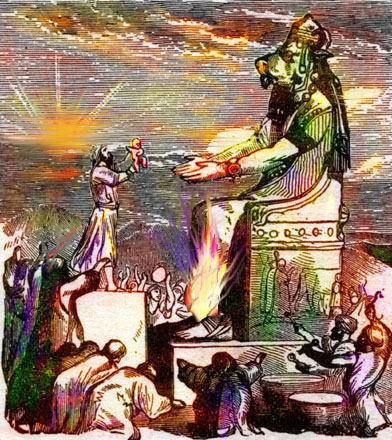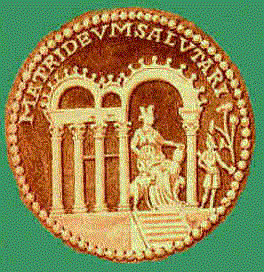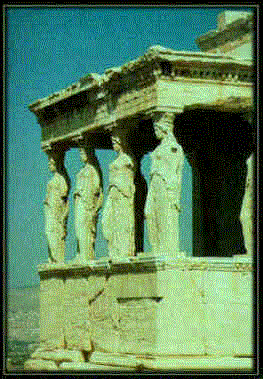Calf worship at Mount Mount Sinai Kenneth Sublett, Piney.com, Hohenwald, Tennessee
As punishment, God turned the people over to "worship the starry host" and set the Levites in front of the Tabernacle to keep the people--now called strangers--out of God's symbolic presence. The rising up to play was the feast with and for the dead and the musical worship was proof that they had deserted God.
The older generation was wasted in the wilderness and the youth led Israel into Canaan but without God's DIRECT accompaniment. God said that if He didn't remove Himself from a direct contact He would destroy them.
However, Canaan had ceased to be a land of milk and honey and is now recognized universally as the grave yard of most of the nation. They would immediately take their Egyptian paganism, merge it with Canaanite Baalism and "fire" God as their King.
God then turned them over directly to the worship which you see in modern charismatic body worship. After the division of the kingdom, Amos 5 shows the nature of the worship of Chiun or Remphan while the Jews worshiped Molech in Jerusalem.
Isaiah 30 shows how the sign of MUSICAL WORSHIP is just a MARK of God pouring out His wrath like the musical warfare against Jesus.
Therefore, adopting the CANAANITE pattern naturally follows the Shellyite pattern of seeing the Exodus as a pattern for Christian worship and community."
As music belonged to the feminine, when David adopted it for the future temple it was a sign of an effeminate MUSICAL MINISTRY to do service which meant the HARD BONDAGE God turned them over to as a result of the musical idolatry.
The golden calf
and worship in Egypt Number
One
The golden calf
and worship in Egypt Number
Two
The golden calf
at Mount Sinai
The interpretation of the golden calf throughout the Bible
Interpreted in
the Kabbalah
God is MARKING and
MOCKING you:
Because I have called, and ye refused; I have stretched out my hand, and no man regarded; Proverbs 1:24
But ye have set at nought all my counsel, and would none of my reproof: Proverbs 1:25
I also will laugh at your calamity; I will mock when your fear cometh; Proverbs 1:26Laugh: Sachaq (h7832) saw-khak'; a prim. root; and can mean: to laugh (in pleasure or detraction); by impl. to play: - deride, have in derision, laugh, make merry, mock (-er), play, rejoice, (laugh to) scorn, be in (make) sport.
Of the rising up to play at Mount Sinai as Mocking God:
"The triumphal hymn of Moses had unquestionably a religious character about it; but the employment of music in religious services, though idolatrous, is more distinctly marked in the festivities which attended the erection of the golden calf." (Smith's Bible Dictionary, Music, p. 589).
Mock is: Leag (h3932) law-ag'; a prim. root; to deride; by impl. (as if imitating a foreigner) to speak unintelligibly: - have in derision, laugh (to scorn), mock (on), stammering.
In the EXODUS from Egypt God gave the BOOK of the COVENANT OF GRACE. Israel mocked God in MUSICAL PLAY. As a result, God gave the BOOK OF THE LAW.
The enemies of God's word are explained by Hagar, Mount Sinai, Jerusalem, Egypt and Sodom. Musical worship destroyed the BOOK OF THE COVENANT and gave Israel THE BOOK OF THE LAW to govern a people having rejected a covenant of grace.
For this Agar is mount Sinai in Arabia, and answereth to Jerusalem which now is, and is in bondage with her children. Galatians 4:25
And their dead bodies shall lie in the street of the great city, which spiritually is called Sodom and Egypt, where also our Lord was crucified. Revelation 11:8
An early church scholar wrote:
Let us then ever obey the voice of the divine word. For the to-day signifies eternity. And day is the symbol of light; and the light of men is the Word, by whom we behold God.
Rightly, then, to those that have believed and obey, grace will superabound; while with those that have been unbelieving, and err in heart, and have not known the Lord's ways, which John commanded to make straight and to prepare, God is incensed, and those He threatens.
And, indeed, the old Hebrew wanderers in the desert received typically the end of the threatening;
for they are said not to have entered into the rest, because of unbelief,
till, having followed the successor of Moses, they learned by experience, though late, that they could not be saved otherwise than by believing on Jesus.But the Lord, in His love to man, invites all men to the knowledge of the truth, and for this end sends the Paraclete . What, then, is this knowledge? Godliness; and "godliness," according to Paul, "is profitable for all things, having the promise of the life that now is, and of that which is to come. {1 Tim. iv. 8.} Arnobius, Against Heresies.
Summary of the model
1. God's first impulse was to leave Israel in Egypt to self-destruct because they ignored Him for over four hundred years. However, He rescued them out of pure grace to protect His own Name because He had made a promise. (Deuteronomy 9:5; 7:8)
2. He did not command sacrifices as a "price" in order to bring Israel from bondage, through the "death and baptism" in the Red Sea, and to "recreate" them when safe from Pharaoh. Rather, He restated the Covenant made with Abraham. It was called The Book of the Covenant.
And he took the book of the covenant, and read in the audience of the people: and they said, All that the Lord hath said will we do, and be obedient. Exodus 24:7
3. In the Constitutions of the Holy Apostles, Sec. XX, Ante-Nicene Fathers, the writer agrees that God spoke the Ten Commandments and the Book of the Covenant before Aaron made the calf which represented musical, Egyptian Apis worship. (Hathor was the female counterpart of Apis the bull) Paul would reveal that "Law, rituals, city, city walls and temple were slavery" (Galatians 4:25). Instruments meant warfare with the "brethren." Click to see the Family Tree
4. The laws of the Covenant were righteous but conditional: "If you make an altar this is the way it should be made." God did not want or need someone to sacrifice under threat. This agreed with the sacrifices under the Abrahamic covenant: sacrifices were not commanded and there was no penalty if Abraham did not make them. The command to sacrifice his son was God's way of showing that Abraham had nothing of value to offer (not even his son) but his obedient faith. Therefore, it is said of that place: "God provides." This was the Covenant of Grace or Promise according to Paul to the Galatians
5. While Moses was back upon the mountain, Israel rejected their vows, "mocked" God and turned back to their old Egyptian Apis the calf. Aaron, as prophetic of most Israelite priests, said that the calf saved them. This involved pagan revelry or play with music. Amos shows that Israel totally repeated this event at Samaria. This was Egyptian Calf Worship.
6. When the people worshipped the egyptian calf, Apis, at Mount Sinai, God "bound them with bonds which could not be loosed, with a mortifying burden and a hard collar."
7. Moses broke the first tablets and wrote a different set along with The Book of the Law which had 613 micvah. Ezekiel said they "were not good."
The older generation had been dropped off before the youth took over and led them into Canaan. However, the laws which they take with them are the laws of a totally secular "worship and communigy."
Wherefore I gave them also statutes that were not good, and judgments whereby they should not live; Ezekiel 20:25
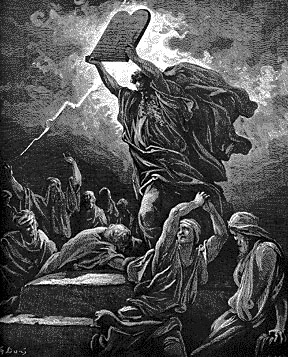
Moses Breaking the Tablets of the Law by Gustave Dore
The Law and temple at Jerusalem were signs of slavery typified by Hagar. It is fitting that God under none of the names under which He was iidentified appeared to Hagar in the wilderness. Rather, God sent His angel because Ishmael was not a covenant person.
Of Jerusalem:
Hear the word of the Lord, ye rulers of Sodom; give ear unto the law of our God, ye people of Gomorrah. Isaiah 1:10
And their dead bodies shall lie in the street of the great city, which spiritually is called Sodom and Egypt, where also our Lord was crucified. Rev11:8
9. God said that Israel would self-destruct and He would carry out His delayed sentence of captivity and death.
10. Before the Law, He promised to drive out the enemy. After they sinned He virtually deserted them spiritually. He even defined the nature of the king they would select. After Saul, they would have to live like the nations and this included murdering the enemy which God could have driven out with taunts or panic songs or wasps.
11. After the Egyptian Calf worship, God no longer said, "If thou makest," but, "make an altar, and sacrifice perpetually; for thou art forgetful and ungrateful." This was not a pattern for modern worship but to prove to Israel that they needed the grace of God's covenant. This is called The Book of the Law "added because of transgression." Therefore, Deuteronomy is called "the second law."
And the Lord shall separate him unto evil out of all the tribes of Israel, according to all the curses of the covenant that are written in this book of the law: Deuteronomy 29:21 (Deuteronomy means "second law.")
12. When Israel totally refused to live in relationship with God and mankind, He said repeatedly that "I hate your sacrifices." God never got hungry and therefore did not need or want sacrifices&emdash;they were to avoid His wrath and not to feed or entertain Him. They were to punish and discipline. When Israel did not repent under the burden of the Law God hated that which He did not need.
"The sacrifices of the ungodly are abomination to the Lord, for they offer them unlawfully." Proverbs 21:27 LXX
The Septuagint shows that it was not just a "bad mental attitude." Rather, the ungodly choose "unlawful" methods for worship because they were dissatisfied with God's plan.
When the congregation of Israel assembled for instruction, musical praise with instruments was forbidden by the Law of Moses (Numbers 10:7). God gave this law as the result of their rising up to play at Mount Sinai as they worshipped the golden calf with singing, dancing naked and playing musical instruments. Speaking of the hymn after crossing the Red Sea, Smith's Bible Dictionary says that:
"The triumphal hymn of Moses had unquestionably a religious character about it; but the employment of music in religious services, though idolatrous, is more distinctly marked in the festivities which attended the erection of the golden calf." (Smith's Bible Dictionary, Music, p. 589).
This is the rising up to play with gender confusion, singing, dancing, clapping, playing instruments and eating the ancient Egyptian Marzeah or Agape which was a feast with and for the dead. That is, the eating of the feasts rather than remembering the Passover and the Lord's Death was a MARK that they had been cut loose from God. Therefore, Stephen says that "He turned them over to worship the heavenly STARS." Musical performers are called STARS because they revolved like the planets and produced the "ladder" to ascend up to the gods.
"In the New Testament there is nowhere any emphasis laid on the musical form of the hymns; and in particular none on instrumental accompaniment whereas this is significantly paganism." (Delling, Gerhard, Worship in the New Testament, trans. Percy Scott Phil. Westminster press, 1962, p. 86).
And it came to pass at the end of the four hundred and thirty years, even the selfsame day it came to pass, that all the hosts of the Lord went out from the land of Egypt Exodus12:41
First: Ezekiel records the story of Israel's failure under The Covenant:
AND it came to pass in the seventh year, in the fifth month, the tenth day of the month, that certain of the elders of Israel came to enquire of the Lord, and sat before me. Ezekiel 20:1
Then came the word of the Lord unto me, saying, Ezekiel 20: 2
Son of man, speak unto the elders of Israel, and say unto them, Thus saith the Lord God; Are ye come to enquire of me? As I live, saith the Lord God, I will not be enquired of by you. Ezekiel 20: 3
Wilt thou judge them, son of man, wilt thou judge them? cause them to know the abominations of their fathers: Ezekiel 20: 4
And say unto them, Thus saith the Lord God; In the day when I chose Israel, and lifted up mine hand unto the seed of the house of Jacob, and made myself known unto them in the land of Egypt, when I lifted up mine hand unto them, saying, I am the Lord your God; Ezekiel 20: 5
In the day that I lifted up mine hand unto them, to bring them forth of the land of Egypt into a land that I had espied for them, flowing with milk and honey, which is the glory of all lands: Ezekiel 20: 6
Second: Israel's Worship While in Egypt:
While in Egypt, the Hebrews practiced a religion involving literal and spiritual adultery. The engaged in Egyptian calf worship. They did not offer volunteer sacrifices to God but to the Apis bull representing Osiris and other nature gods. As Aaron was willing to make the Israelites a golden calf so that they could worship the True God in the way they worshiped the gods of Egypt, Miriam led the women out exactly the way she probably did in Egypt. The entire tribe was unworthy of rescue and God would have been justified in allowing every man, woman and child to remain in idolatrous slavery. However, He picked certain people to prove that He could do what the imaginary gods claimed to do. Of the Egyptian worship:
"In the New Kingdom women singers were found in large numbers in all the temples. Women and girls from the different ranks of society were proud to enter the service of the gods as singers and musicians.
The understanding of this service was singular:
these singers constituted the 'harem of the gods'." (Quasten, Johannes, Music and Worship in Pagan and Christian Antiquity, p. 77)
In the pagan temples, to say musician or singer was to say "concubine" - both male and female. They were often called Holy Whores because they thought that exciting the human senses to gain a "feeling" was worship. Solomon was not exempt and fulfilled the prophecy of God that the kings would lead Israel them into worship like the nations but they would not get by with it. Solomon bragged:
I gathered me also silver and gold, and the peculiar treasure of kings and of the provinces: I gat me men singers and women singers, and the delights of the sons of men, as musical instruments, and that of all sorts. Ecclesiastes 2:8
Or as Solomon bred both men and animals:
Next I bought slaves, both men and women, and others were born within my household. I also bred great herds and flocks, more than any of the kings before me.
I collected silver and gold as taxes from many kings and provinces. In the cultural arts,
I organized men's and women's choirs and orchestras. And then there were my many beautiful concubines. Ecclesties 2:7LIVThese "musicians" or "concubines" are defined by the Hebrew word:
Shiddah (h7705) shid-dah'; from 7703; a wife (as mistress of the house): - * all sorts, musical instrument.
Shadad (h7703) shaw-dad'; a prim. root; prop. to be burly, i. e. (fig.) powerful (pass. impregnable); by impl. to ravage: - dead, destroy (- er), oppress, robber, spoil (-er), * utterly, (lay) waste.
The most important leader of the musical guilds "appointed by the king and the military commanders" was Asaph. All of the musical guild references are related to the Canaanite guilds who worked for the civil authorities and not the religious wing which, under the kings, was usurped by the national government:
Asaph (h622) aw-saf'; a prim. root; to gather for any purpose; hence to receive, take away, i. e. remove (destroy, leave behind, put up, restore, etc.): - assemble, bring, consume, destroy, fetch, gather (in, together, up again), generally, get (him), lose, put all together, receive, recover [another from leprosy], (be) rereward, * surely, take (away, into, up), * utterly, withdraw.
|
Please
be aware: All of
the musical terms involving instruments in both Hebrew and Greek carry
the idea of taking your inheritance, excelling over, oppressing or
grinding you to bits. The fact that it feels so spiritual and attracts
the masses is absolute proof of this fact.
|
Solomon elevated pleasure-seeking and even evil-seeking to an art. However, after he tried all of these things and failed, he wrote:
Vanity of vanities, saith the preacher; all is vanity. Ecclesties 12:8
........... Let us hear the conclusion of the whole matter:
........... Fear God, and keep his commandments:
........... for this is the whole duty of man. Ecclesties 12:13
Amos notes that Israel did not worship Yahweh for the 430 years in Egypt. Instead, they practiced the Egyptian forms of musical, charismatic worship:
"they could not fail to become acquainted with forms of religious worship hitherto utterly unknown to them. Now, for the first time, could they witness the gorgeous and mysterous ceremonies that attended the worship of Ra, the 'Sun-God,' or of Isis and osiris.
Click to see Rubel Shelly baptizing the S.U.N. god to vizualize the S.O.N. God. And then look at Shamash or S.U.N. worship where Max Lucado holds out hope for the redemption of Lucifer, the mostly-female musician God put in the Garden of Eden to test Adam and Eve. The serpent was not a snake but a Chaldean soothsayer who came equipped with pipes and tambourines (symols of feminism)
See the Hymn to Shamash who was worshiped as they went into Canaan as Molech in Jerusalem and Remphan or Chiun or Molech in Israel as condemned by Amos 6.
